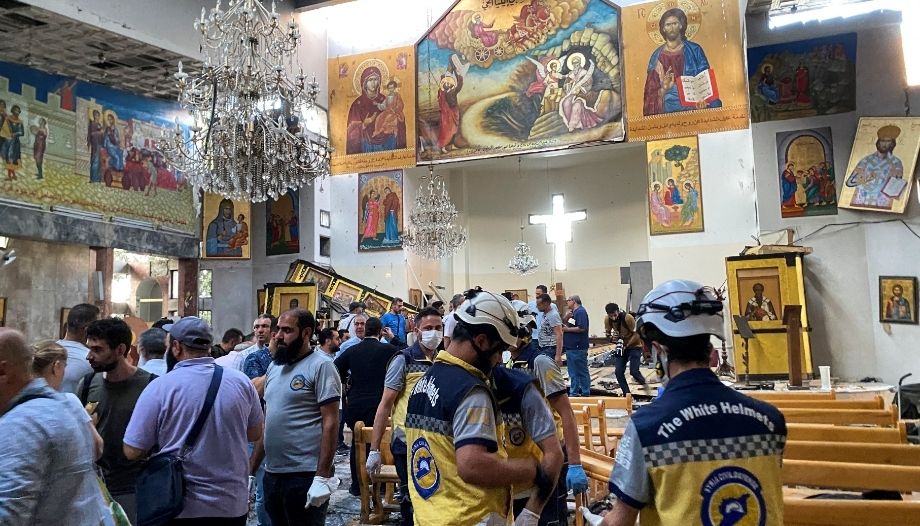Carol Glatz, Vatican City (CNS). In the Audience On Wednesday, June 25, Pope Leo XIV condemned the suicide bombing of a church in Damascus as a "cowardly terrorist attack" and called for an end to the bloodshed, urging the international community not to abandon Syria.
He also called for dialogue, diplomacy and peace for the entire Middle East, quoting the prophet Isaiah: "No longer shall one nation lift up the sword against another nation. No longer shall they learn the art of war."
"Let this voice of the Most High be heard!" he said at the end of his weekly General Audience in St. Peter's Square on June 25.
Dialogue, diplomacy and peace
"Let the wounds caused by the bloody events of recent days be healed. That all logic of intimidation and revenge be rejected and that the path of dialogue, diplomacy and peace be chosen with determination," he said.
At least 25 people were killed and 63 others were injured after a suicide bomber opened fire and detonated an explosive vest at St. Elijah Greek Orthodox Church in Damascus, Syria, on June 22 during Sunday liturgy.
The jihadist group Saraya Ansar Al-Sunna claimed responsibility for the attack, AFP reported on June 24. It is the first such attack in Damascus since former President Bashar al-Assad was overthrown by Islamist rebels in December, ending 13 years of civil war.
Solidarity and prayers for those affected
Pope Leo sent a telegram expressing his sadness for "the loss of life and destruction caused by the attack".
He also expressed his solidarity and prayers for all those affected by the tragedy in the telegram, sent on behalf of the Pope by Cardinal Pietro Parolin, Vatican Secretary of State, on June 24.
After offering his greetings in several languages at the end of his weekly general audience in the square, the Pope said Sunday's bombing was "a cowardly terrorist attack."
Syria's deep fragility: offering it support
Offering his prayers for the victims and their families, the Pope said: "This tragic event reminds us of the profound fragility that continues to characterize the world's most vulnerable people. Syria after years of conflict and instability"...
"It is therefore essential that the international community does not look away from this country, but continues to offer its support through gestures of solidarity and a renewed commitment to peace and reconciliation," he said.
Pope Leo then addressed all the Christians of the Middle East saying: "I am close to you, the whole Church is close to you".
"We follow developments in Iran, Israel and Palestine closely and with hope," he said.
"The words of the prophet Isaiah resonate with more urgency than ever," he said, citing the vision of Zion, where nations will beat their swords into plows and put an end to the art of war.
"Let this voice of the Most High be heard!" he said to applause, calling for a rejection of revenge and a return to dialogue.
Leo XIV: faith in Jesus brings healing, hope and new life
Today's catechesis of Pope Leo XIV continued the cycle of the Jubilee 2025, 'Jesus Christ, Our Hope'. It focused on 'The healings. The hemorrhaging woman and the daughter of Jairus. Do not be afraid, have faith alone''.
"Today we meditate on the healings that Jesus performed as a sign of hope. The Gospel we have heard presents us with two stories: that of a woman who has been ill for twelve years and that of a girl who is about to die," the Pope said.
The woman, considered impure and condemned to isolation, dares to approach Jesus in silence, convinced that it is enough to touch his cloak to be healed. "Although many touched Christ in the crowd, she alone was healed. Why? Because she touched him in faith," the Pontiff said.
"The strength of a sincere faith is immense."
"Perhaps even today many approach Jesus in a superficial way," the Pope continued. "We enter our churches, but our heart remains outside. This woman, silent and anonymous, overcame her fears and touched the heart of Jesus with hands that everyone judged impure. And the Lord healed her because of her faith."
Nor does the girl's father give up in the face of the news of death, Leo XIV commented. Jesus says to him: 'Do not be afraid, only have faith'. He enters the house, takes the girl by the hand and life returns. "Immense is the power of a sincere faith, which touches Jesus with confidence - even from weakness - because it lets his blessed hands act. When faith is true, our hope is confirmed. The grace of Christ acts and life is restored to us".
In some of his speeches to pilgrims of different languages, the Pope recalled the Feast of the Sacred Heart of Jesus and the Feast of Saints Peter and Paul on Sunday, the 29th: "In life there are moments of disillusionment, discouragement and even death. Let us learn from that woman and that father: let us go to Jesus. He can heal us, he can give us life. He is our hope! Thank you very much", concluded Leo XIV.








